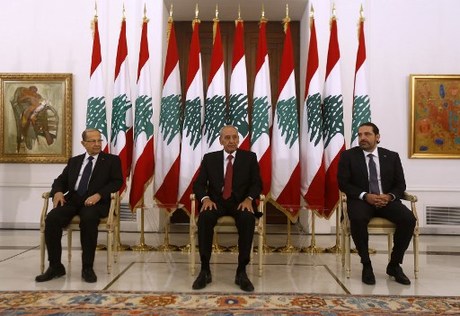
Almost 1,000 candidates are registered for Lebanon’s first parliamentary elections in nearly a decade. Though many voters are baffled about what is at stake – attention is dominated by who is allied with who, rather than what anyone stands for – at least one thing seems certain. When a new government is formed, Nabih Berri will keep his job as speaker of parliament.
Now 80, Mr Berri’s political career is inextricably linked to Lebanon’s devastating 15-year civil war.
A Shiite, he led resistance against the Israeli army’s occupation, especially in southern Lebanon, becoming leader of the Shiite Amal movement in 1980. He has been parliament speaker since 1992, when the country formed its first post-war government.
In a sign of how old battles are never far from the surface in Lebanese politics, one of his main adversaries is Lebanon’s President Michel Aoun, a Christian and former army general who fought on the opposite side in the civil war.
The nub of their most recent dispute – which many say was designed to destabilise Mr Berri’s supporters before the May 6 election – lies in blood, as much as politics. Gibran Bassil, Mr Aoun’s son-in-law, is Lebanon’s foreign minister. The former’s decision to call Mr Berri a thug led to tires being set on fire and roads being blocked in January, before Mr Aoun called for calm.
And though jockeying for power has long replaced governing in Lebanon – rows and crumbling coalitions meant much of the past decade has been spent without a cabinet – old alliances are Mr Berri’s salvation.
While campaigning in Beirut on Tuesday, Nohad Mashnouk, the interior minister and a member of prime minister Saad Hariri’s Future party, said Mr Berri’s role “is not a subject up for discussion”.
The statement was a response to a warning last week by Progressive Socialist party leader Walid Jumblatt an ally of Mr Berri since they fought together during the civl war, against any attempt to remove the speaker.
Mr Jumblatt’s warning was directed at Future’s leaders and the Free Patriotic Movement, the country’s largest Christian political party, led by Mr Bassil.
Recent months have also found Mr Hariri attempting to mediate between Mr Berri and Mr Aoun after the latter approved promotions for number of army officers without first consulting finance minister Ali Hasan Khalil, one of Mr Berri’s deputies and possible successor as leader of Amal.
Mr Berri complained that the vast majority of the officers being promoted were Maronite Christians.
The post of speaker of parliament in Lebanon is reserved for a Shiite Muslim, just as Lebanon’s constitution stipulates that the prime minister should be a Sunni Muslim and the president a Maronite Christian.
Mr Berri’s Amal movement was founded by cleric Mousa Sadr in 1974 to empower Lebanon’s historically dispossessed Shiite community. The legacy of challenging Israel’s occupation in the 1980s plays strongly.
“Fundamentally, he’s a great political operator,” said Mohamad Bazzi, a Lebanese journalist and professor at New York University. “I wouldn’t bet against him. He’s survived so much.
“On the face of it, the strongest political movement in the Shiite community is Hezbollah – it surpassed Amal several decades ago. They took the dominant role in the fight in southern Lebanon and got more and more support from Iran, but Berri managed to keep his political fiefdom.”
Yet it likely serves Hezbollah’s interests to have Berri at the forefront as the country’s top Shiite politician.
“If Hezbollah wanted it, they could take the speakership, but that could cause problems because of outside powers,” Mr Bazzi said, alluding to the competing rivalries of Saudi Arabia and Iran.
Lebanese pollster Abdo Saad said Mr Berri’s near certain return as speaker is likely to be matched with little change more broadly.
“The same group will stay, the same parties. The only difference is going to be that the Future current (Mr Hariri’s party) will see their bloc decrease, from 35 to 22 seats,” Mr Saad said, calling Mr Berri “a very charismatic leader”.
At an open air café in downtown Beirut, festooned with posters of Mr Berri and Mousa Sadr in Zoqaq Al Blatt, a predominantly Shiite neighborhood, Amal supporters laughed when asked how Mr Berri had managed to remain in his post for so long.
“We are a sectarian country,” one young man said. “And he is the smartest Shiite.”
The National

Leave a Reply
You must be logged in to post a comment.